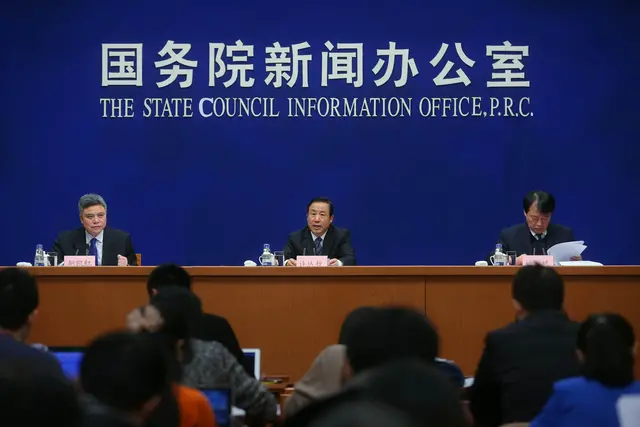China published its first nuclear white paper on Wednesday, detailing policies and measures relating to nuclear emergency preparedness and highlighting a "rational, coordinated and balanced" nuclear security approach.
"China has consistently given top priority to nuclear safety in its peaceful use of nuclear energy," said the white paper, China's Nuclear Emergency Preparedness which was issued by the State Council Information Office.
Elaborating on the promotion of nuclear security, the white paper said China placed "equal emphasis" on development and safety.
The white paper reviewed China's "sound safety record" since nuclear activities began in the mid 1950s, stating that nuclear facilities and activities had always been "in a safe and stable state" and safety at nuclear power stations was in a state of constant improvement.
"None of the nuclear power generating units on the Chinese mainland has suffered events or accidents rated above Level 2 under the International Nuclear and Radiological Event Scale, with the release of gaseous and liquid effluents kept far below the national regulatory limits," it said.
The white paper attributed the good safety record to improved techniques, rigorous supervision and better emergency management in the past six decades.
China has "the most advanced technology and most stringent standards," which ensure safe and efficient development of nuclear power, it said.
"Nuclear accidents know no national boundaries, and everything related to nuclear emergency management is too important to be taken lightly," the white paper said.
The government slowed approval for new nuclear power generators after the Fukushima nuclear accident in 2011, rolling out measures to ensure nuclear facility safety between 2011 and 2014, Xu Dazhe, head of the China Atomic Energy Authority, said at a press conference on Wednesday.
The measures include inspections on all facilities in operation and under construction and improvements to the nuclear emergency response system, Xu said.
The mainland now has 30 operational nuclear power generating units, with a total installed capacity of 28.31 GW. It also has 24 units with a total installed capacity of 26.72 GW under construction, ranking first in the world.
The government approved the construction of eight nuclear power generating units last year.
"At this rate, we can reach the goal of raising the installed nuclear power capacity to 58 GW with an additional 30 GW under construction by 2020 as planned," Xu said.
China is also looking into the feasibility of building nuclear power plants in offshore and inland areas, Xu said.
Drawing on lessons from the Three Mile Island, Chernobyl and Fukushima nuclear accidents, China has developed nuclear emergency-related activities, such as laws and standards and international cooperation and exchanges.
The nuclear emergency rescue network is "of a proper scale, well-coordinated and of a rational layout," the white paper said.
Eight state-level specialized technical support centers addressing nuclear emergency and 25 rescue task forces involving 1,300 people have been established.
There is also a plan to build a new national nuclear emergency rescue team of 320 members to respond to serious nuclear accidents and international rescue operations.
China is to speed up the drafting of the nuclear safety and atomic energy laws, the white paper said, adding that China has been dedicated to promoting an international nuclear safety emergency system and sharing achievements in peaceful use of nuclear energy with other countries.
China General Nuclear Power Corp. and Electricite de France signed an agreement to build a nuclear power plant at Hinkley Point C in Britain. China's third-generation nuclear reactor design, known as Hualong One, is expected to be used in the project.
"China, France and Britain are all leading players in peaceful use of nuclear energy," Xu said. "We should have confidence in the multilateral cooperation and look forward to a model project."
The government vowed to upgrade its nuclear emergency work to "a new level" in order to provide a robust bulwark in support of the safe, efficient, sustainable and healthy development of the nuclear energy sector.
"We don't want contingency plans to be put into operation, but with all the precautions taken, safety would be guaranteed," Xu said.
 简体中文
简体中文






